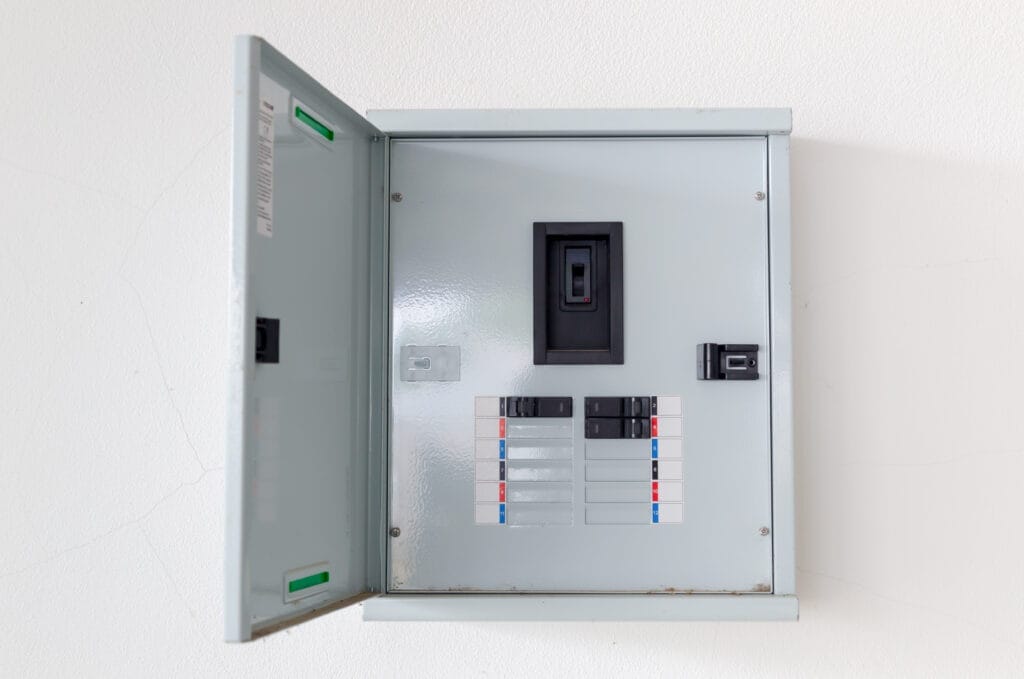
What Is circuit breaker tripping? If you’ve ever had the lights suddenly go out or appliances stop working unexpectedly, you may have experienced a tripped circuit breaker. While circuit breakers are designed to protect your home from electrical overloads, frequent tripping can be a sign of a more serious problem. Understanding why your circuit breaker trips and when to call an electrician is essential for maintaining a safe and functional electrical system in your home. Here’s what Denver metro area homeowners need to know about circuit breakers and when to seek professional help.
1. What Causes a Circuit Breaker to Trip?
Circuit breakers are safety devices designed to shut off power when they detect an issue that could cause damage to your electrical system or appliances. The most common reasons for circuit breaker tripping include:
- Overloaded Circuit: This occurs when too many devices are plugged into a single circuit, drawing more power than the circuit can safely handle. The breaker trips to prevent overheating and potential electrical fires.
- Short Circuit: A short circuit happens when a live wire touches another wire or a grounded part of the electrical system, causing a large spike in electrical current. This is a more dangerous situation that can cause sparks or even fires.
- Ground Fault: A ground fault occurs when a live wire touches a metal part or the ground, causing the breaker to trip. Ground faults are especially common in areas with moisture, such as bathrooms or kitchens.
- Faulty Appliances: Sometimes, the issue isn’t with the circuit but with a malfunctioning appliance that’s drawing too much power or causing a short circuit.
2. Signs of an Overloaded Circuit
Overloading a circuit is one of the most common reasons for tripping breakers. Some common signs that your circuit breaker tripping include:
- Flickering or dimming lights when using multiple appliances
- Buzzing sounds coming from outlets or switches
- Warm or discolored outlets
- Frequent tripping when using high-power devices like space heaters, hairdryers, or vacuum cleaners
If you notice any of these signs, it’s a good idea to reduce the load on that circuit by unplugging unnecessary devices or upgrading your electrical system to handle your home’s power demands.
3. When to Reset the Breaker
If your circuit breaker trips, resetting it is usually straightforward. Locate your breaker panel, identify the tripped breaker (it will be in the “off” position), and flip it back to the “on” position. However, if the breaker trips immediately after resetting, or if it continues to trip frequently, it’s a sign that there may be a deeper issue that requires professional attention.
4. When to Call an Electrician
While resetting a breaker is safe in most cases, there are times when calling a professional electrician is the best course of action. Here’s when to make that call:
- Frequent Tripping: If your breaker trips repeatedly, it could be a sign of an overloaded circuit, faulty wiring, or a more serious electrical issue. An electrician can inspect your system to identify the underlying cause and make necessary repairs or upgrades.
- Burning Smell or Scorch Marks: If you notice a burning smell near your breaker panel or see scorch marks on outlets, these are serious signs of overheating or electrical fires. Turn off the power and call an electrician immediately.
- Breaker Won’t Reset: If you’re unable to reset the breaker or it trips immediately after resetting, this could indicate a short circuit or ground fault, both of which require immediate attention from a professional.
- Old Electrical System: Homes with older electrical systems may not be equipped to handle modern electrical demands. If your home’s wiring or breaker panel hasn’t been updated in decades, you may need an upgrade to prevent frequent tripping and ensure your home is safe.
How to Prevent Circuit Breaker Tripping
While some issues are beyond your control, there are a few steps homeowners can take to reduce the likelihood of frequent breaker trips:
- Avoid Overloading Circuits: Be mindful of how many devices are plugged into the same outlet or circuit, especially high-wattage appliances.
- Upgrade Your Electrical System: If your home’s electrical system is outdated, upgrading to a higher-capacity system can prevent overloading and improve safety.
- Schedule Regular Electrical Inspections: A professional electrician can inspect your wiring, outlets, and circuit breakers to identify potential issues before they become serious problems.
Protect Your Home with Professional Electrical Services
Circuit breakers play a vital role in protecting your home from electrical dangers, but frequent tripping can be a sign that something’s wrong. Whether it’s an overloaded circuit, faulty wiring, or a need for an electrical system upgrade, the team at Top Shelf Electric, Heating, & Plumbing can help. We provide expert electrical inspections, repairs, and system upgrades for homeowners throughout the Denver metro area.
Contact us today to schedule an inspection and keep your home safe and powered efficiently.

